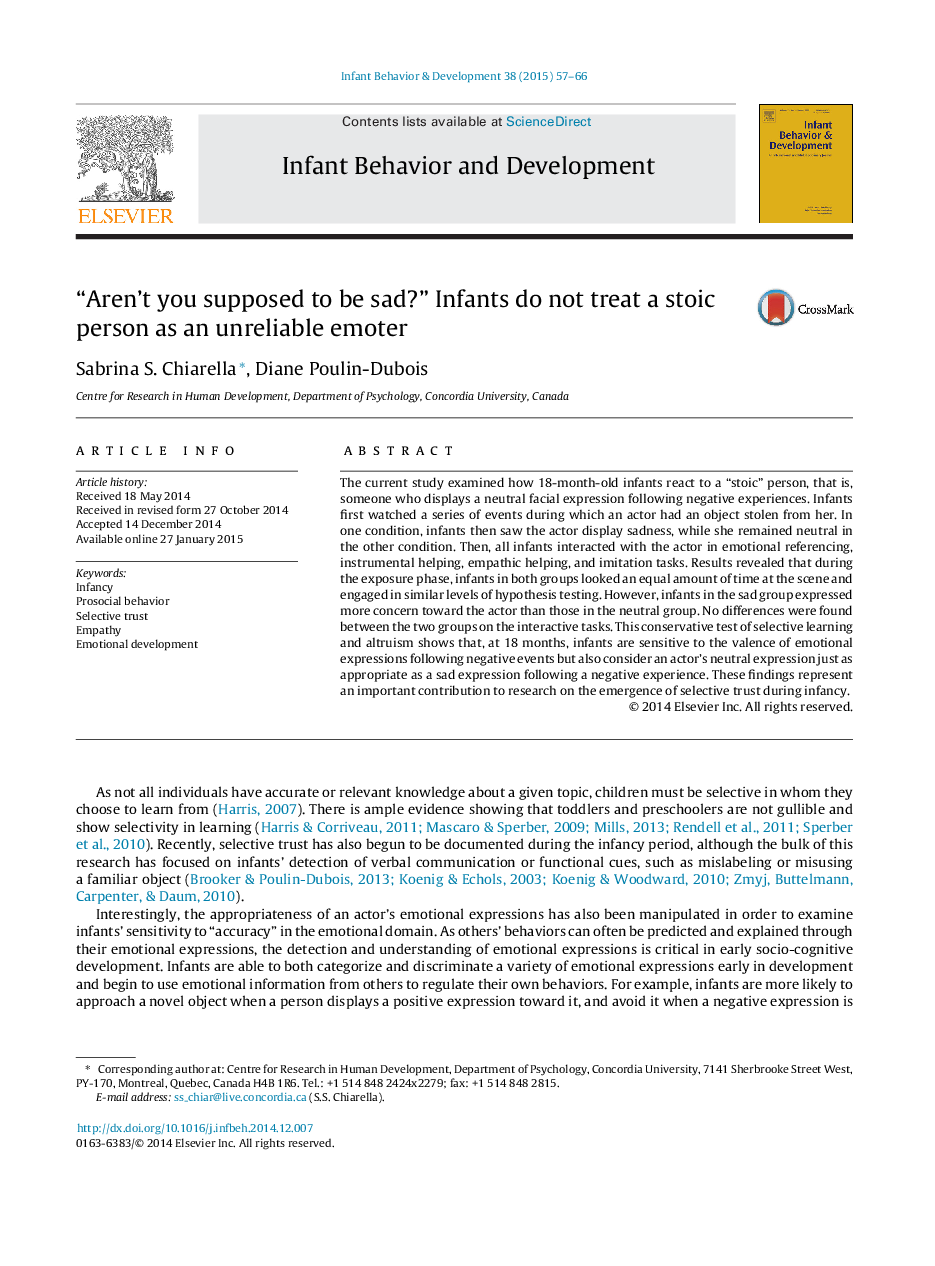| کد مقاله | کد نشریه | سال انتشار | مقاله انگلیسی | نسخه تمام متن |
|---|---|---|---|---|
| 7273432 | 1473422 | 2015 | 10 صفحه PDF | دانلود رایگان |
عنوان انگلیسی مقاله ISI
“Aren't you supposed to be sad?” Infants do not treat a stoic person as an unreliable emoter
ترجمه فارسی عنوان
آیا شما نباید غمگین باشید؟ نوزادان با یک فرد شبیه به عنوان یک خلبان غیرقابل اعتماد رفتار نمی کنند
دانلود مقاله + سفارش ترجمه
دانلود مقاله ISI انگلیسی
رایگان برای ایرانیان
کلمات کلیدی
نوزادان، رفتار طرفدار اعتماد انتخابی، یکدلی، توسعه احساسی،
ترجمه چکیده
در حال حاضر مطالعه مورد بررسی قرار گرفته است که نوزادان 18 ماهه واکنش نشان می دهند؟ فردی، یعنی شخصی که بر اساس صورت منفی بیان شده است. نوزادان ابتدا مجموعه ای از وقایع را دیدند که طی آن یک بازیگر از جسمش به سرقت رفته بود. در یک حالت، نوزادان پسران را دیدند که ناراحتی را نشان دادند، در حالی که او در شرایط دیگر بی طرف بود. سپس، تمام نوزادان با بازیگر در ارجاع عاطفی، کمک ابزار کمک، کمک های همدلی و وظایف تقلبی با بازیگر تعامل داشتند. نتایج نشان داد که در فاز قرار گرفتن در معرض، نوزادان در هر دو گروه زمان مساوی در صحنه را نشان می دادند و در سطوح مشابهی از آزمون فرضیه ها شرکت می کردند. با این حال، نوزادان در گروه غم انگیز نگرانی بیشتری نسبت به بازیگر نسبت به گروه خنثی ابراز نگرانی کردند. تفاوت بین دو گروه در وظایف تعاملی تفاوت وجود ندارد. این آزمون محافظه کارانه در مورد یادگیری انتخابی و نوع دوستی نشان می دهد که در 18 ماه، نوزادان به حساسیت عبارات احساسی پس از حوادث منفی حساس هستند، بلکه بیان بی طرفی بازیگر را نیز به عنوان یک نتیجه غم انگیز به دنبال یک تجربه منفی در نظر می گیرند. این یافته ها نقش مهمی در تحقیق در مورد ظهور اعتماد انتخابی در دوران شیردهی دارد.
موضوعات مرتبط
علوم زیستی و بیوفناوری
علم عصب شناسی
علوم اعصاب رفتاری
چکیده انگلیسی
The current study examined how 18-month-old infants react to a “stoic” person, that is, someone who displays a neutral facial expression following negative experiences. Infants first watched a series of events during which an actor had an object stolen from her. In one condition, infants then saw the actor display sadness, while she remained neutral in the other condition. Then, all infants interacted with the actor in emotional referencing, instrumental helping, empathic helping, and imitation tasks. Results revealed that during the exposure phase, infants in both groups looked an equal amount of time at the scene and engaged in similar levels of hypothesis testing. However, infants in the sad group expressed more concern toward the actor than those in the neutral group. No differences were found between the two groups on the interactive tasks. This conservative test of selective learning and altruism shows that, at 18 months, infants are sensitive to the valence of emotional expressions following negative events but also consider an actor's neutral expression just as appropriate as a sad expression following a negative experience. These findings represent an important contribution to research on the emergence of selective trust during infancy.
ناشر
Database: Elsevier - ScienceDirect (ساینس دایرکت)
Journal: Infant Behavior and Development - Volume 38, February 2015, Pages 57-66
Journal: Infant Behavior and Development - Volume 38, February 2015, Pages 57-66
نویسندگان
Sabrina S. Chiarella, Diane Poulin-Dubois,
